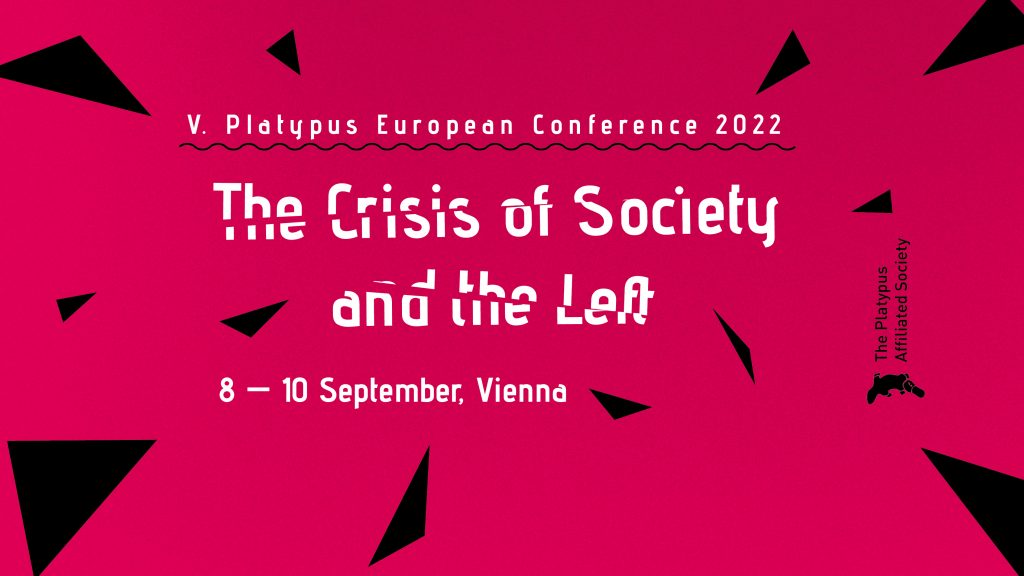
The V. European Conference of the Platypus Affiliated Society took place from September 8-10, 2022 at the University of Vienna, Austria. You can find the video and audio recordings of all the events below.
Thursday, September 8th
Panel Discussion: Was ist das Kritische an der Kritik der politischen Ökonomie? [German]
Was ist bürgerliche politische Ökonomie und warum entwickelt Marx eine Kritik an ihr? Wie verhält sich diese Kritik an der politischen Ökonomie zu seiner Kritik des Sozialismus? Was ist das spezifisch Politische daran? Inwiefern ist seine Kritik an der politischen Ökonomie dialektisch? Inwiefern lässt sich durch eine Rückkehr zu Marxens Kritik der politischen Ökonomie der Kampf um den Sozialismus heute re-aktualisieren?
5–7 pm (Hörsaal I at Neues Institutsgebäude, Universitätsstraße 7, 1010 Vienna)
Speakers:
- Lars Quadfasel (Hamburger Studienbibliothek)
- Representative Der Funke/International Marxist Tendency
- Frieder Otto Wolf (Philosopher and Political Scientist)
Friday, September 9th
Teach-In: What is Society?
After the fall of the Berlin Wall, both Thatcher and Laclau could agree on one thing: “society” does not exist. Since 2015, a meme circulates stating vapidly: “We live in a society.” What was society? What is its crisis? Two 19th century phenomena, “socialism” and “sociology”, continue to haunt us. Can we make sense of them without a concept of “society”?
10–12 am (Hörsaal I at Neues Institutsgebäude, Universitätsstraße 7, 1010 Vienna)
Presentations by different leftists organizations
Different leftist organizations get the opportunity to present themselves, their aims, and their activities.
1.30–4 pm (Hörsaal 6, 2 and 3 at Oskar-Morgenstern-Platz 1, 1090 Vienna)
1.30–2.30 pm
Malmoe
MALMOE is a device for everyday life. Based in Vienna since 2000 the collective prints a newspaper 4 times a year to create a leftist space for discourse and pop-culture. In the workshop we will focus on practical challenges in production and community building.
https://www.malmoe.org/
Hörsaal 6
3–4 pm
Junge Linke (Young Left)
Junge Linke is Austria’s biggest communist youth organisation. Founded in 2018, Junge Linke offers room for education and discussion on the one hand and the opportunity of coordinated political action on the other. Today Junge Linke is closely cooperating with the Austrian Communist Party (KPÖ) in attempting to rebuild a strong and unified Left.
https://www.jungelinke.at/
Hörsaal 2
transform! europe
transform! europe is a network of 39 European organisations from 23 countries, active in the field of political education and critical scientific analysis, and is the recognised political foundation corresponding to the Party of the European Left (EL). The Workshop will focus on a presentation given by member of transform Dunja Larise on the following topic: 'Why is Austromarxism still worth studying in the 21st century?'
https://www.transform-network.net/about-us/
Hörsaal 3
Panel Discussion: The Dictatorship of the Proletariat and the Left
What was the Marxist understanding of the Dictatorship of the Proletariat? How has our understanding of the necessity of the dictatorship of the proletariat been shaped and changed over the course of the 20th century? What is its relevance for the struggle for socialism today?
5–7 pm (Hörsaal I at Neues Institutsgebäude, Universitätsstraße 7, 1010 Vienna)
Speakers:
- Thodoris Velissaris (Platypus Affiliated Society)
- David Harvie (Political Economist)
- Gavin Mendel-Gleason (Workers' Party of Ireland)
- Olga Stefou (SYRIZA)
Saturday, September 10th
Teach-In: Prefigurative Politics and the Millennial Left
Before folding into centre-Left political parties, the Millennial Left went through a ‘neo-anarchist’ or ‘prefigurative’ phase. The ‘movement of the squares’ (encompassing Occupy and the Indignados) is the most visible manifestation of this prefigurative turn in politics. With prefiguration on the rise again today, this teach-in seeks to clarify and critique this tendency as a historical phenomenon of the Left.
10–12 am (Hörsaal III at Neues Institutsgebäude, Universitätsstraße 7, 1010 Vienna)
Panel Discussion: Solidarność in the 1980s and the politics of solidarity
Solidarność (Solidarity) emerged in Poland in 1980 as a movement for workers solidarity with self-governing shipyard unions. With the support of dissident Polish intellectuals at home and broad sections of the Left abroad, Solidarność grew in strength and became a key participant in Polish reforms through the 80s and beyond. As such, it can appear as either a late expression of New Left attempts to further the revolution, or as a prefiguration of the dissolution of the Soviet Union.
2–4 pm (Hörsaal I at Neues Institutsgebäude, Universitätsstraße 7, 1010 Vienna)
Speakers:
- Bruno Drweski (National Institute of Oriental Languages and Civilizations)
- Ákos Földesi (Szikra)
- Mateusz Wasilewski (Platypus Affiliated Society)
- Marek Beylin (Historian and Journalist)
Public Interview: What is Left of SYRIZA?
“You, SYRIZA, the true miracle, radical left movement, which stepped out of the comfortable position of marginal resistance and courageously signaled your readiness to take power. This is why you have to be punished.”
- Slavoj Zizek, 2012
In the recent past SYRIZA exemplified a moment of hope for a large part of the (European) Left. In sharp contrast, today it is considered an example of capitulation to the establishment and a scapegoat for the spoiled chances of the anti-austerity struggles. The stakes of SYRIZA politics were enigmatically expressed in the phrase: “SYRIZA was in government but not in power”. This interview wants to explore the legacy of SYRIZA and the sense in which SYRIZA did or did not express potential for radical political change. Nikos Manousakis, member of the Platypus Affiliated Society, will interview Olga Stefou, member of the SYRIZA Central Committee.
5–7 pm (Hörsaal I at Neues Institutsgebäude, Universitätsstraße 7, 1010 Vienna)
Die Ohnmacht der Linken lässt sich nachverfolgen bis in die 30er-Jahre, zu den sozialistischen und kommunistischen Massenparteien in Europa im Angesicht des Faschismus. Auf das Wachstum faschistischer Bewegungen antworteten sie mit Panik und Kapitulation, ihre Politik resultierte in ihrer Selbstaufgabe als unabhängige politische und soziale Vertretungsorgane des Proletariats. Revolutionäre Parteien verwandelten sich in Stützen des bürgerlich-demokratischen Regimes.

